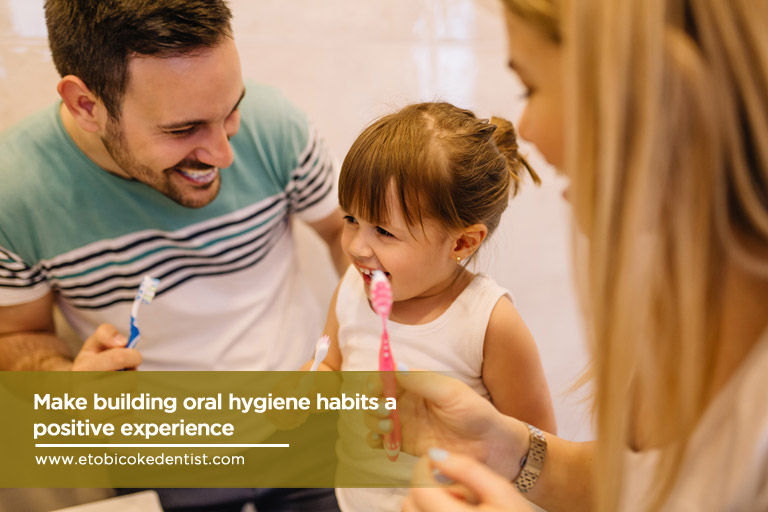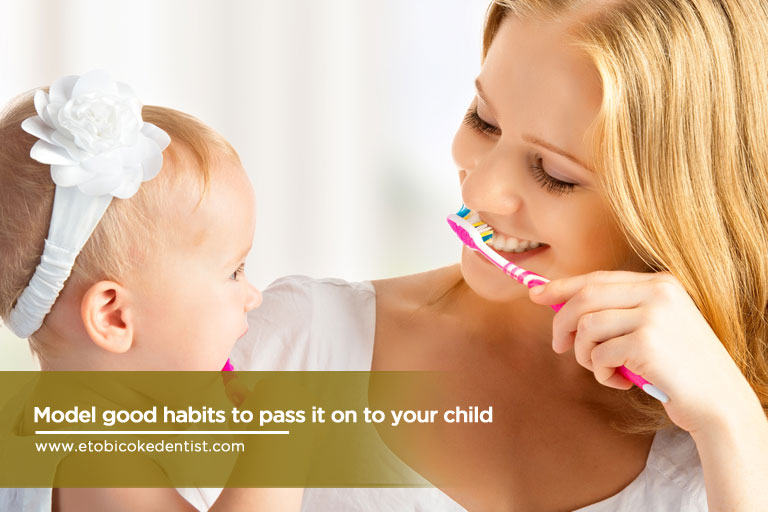Inspiring your child to learn good oral habits while they are young ensures that they will take those habits with them to adulthood. It instills in their minds the importance of keeping their teeth healthy and strong. Doing so prevents major oral health problems from plaguing them when they are grown.

What Habits to Teach Your Children
Protect your child’s teeth and make sure that they keep their bright and healthy smile by teaching them the following:
-
- Brush twice dailyFrom the ages of six to eight, your child is old enough to brush their teeth. Have them do this by themselves while you monitor them so that you know that they are using the proper brushing techniques. Be certain that they spend the right amount of time brushing, which is two minutes twice every day.
- Floss every dayBrushing alone isn’t enough. Sometimes, bits of food and plaque can get stuck between the teeth. Flossing cleans the areas that a toothbrush can’t reach. This prevents the buildup of plaque between teeth from forming cavities. Flossing should be done at least once a day, preferably before going to bed.

- Eat healthy foodTeeth need proper nutrition to be healthy. Your kids need to eat the right kinds of food, specifically, those that contain the nutrients that strengthen teeth. These include calcium, iron, vitamin B2, B3, B12, C, and D.Keep your child from eating candy, ice cream, and other sugary foodstuffs. Food and beverages high in sugar can cause oral health problems, like cavities and gum disease. In addition to healthy teeth and the prevention of long-term dental issues, making sure your child eats well promotes their overall wellbeing.
- Drink ample amounts of waterEncourage your kids to drink enough water. Water makes up 99% of saliva, which is the body’s natural defence against plaque and helps to keep cavities at bay. Additionally, a dry mouth increases the risk of tooth decay. Water stimulates the production of saliva to keep the mouth hydrated. Water also naturally contains fluoride which, in the right amounts, can strengthen teeth.Keep your child from relying on sugary drinks, like fruit juice, sports drinks, soda, or energy drinks.

- Don’t use sippy cupsBecause they prevent spillage, sippy cups are seen as a convenient means of feeding the baby. However, they may not necessarily be good for your child. Sippy cups can cause a variety of issues from tooth decay to speech impediments. Have them drink from a cup instead, starting from their first birthday.
- Don’t share toothbrushes (or utensils)Sharing may be a good thing to teach children, but not when it comes to things that they put inside their mouths, like toothbrushes or spoons. Germs can cling to the item and transfer to anyone else who uses it, spreading cavities and other health issues.
- See the dentist regularlyChildren, like adults, should see their dentist at least once every six months for regular checkups and cleaning.
Tips for Teaching Good Dental Hygiene Habits
The challenge most parents face is knowing when and how to start teaching their children about good dental health habits. Here are a few tips to help you get your child started on their journey to learning about how to take care of their teeth and gums:
- Start earlyHabits take a lot of time and effort to develop. It is, therefore, crucial to start teaching your child good oral hygiene habits as early as possible. Start cleaning your child’s teeth regularly when they first appear, which should be around the time your child turns six months. Use water only and wipe their teeth with a soft cloth or use a small toothbrush. When they turn 18 months old, apply a small amount of low-fluoride toothpaste and teach them to spit it out.Preventing cavities as early as infancy is a necessity even if baby teeth fall out in time. Cavities in baby teeth can affect the permanent ones. Keep their baby teeth cavity-free so that their adult teeth are strong and healthy.

- Teach by exampleChildren emulate what their parents do. Showing works much more effectively than telling. When they’re old enough, brush together with them. Show them your brushing and flossing technique. You may have to assist them if they are too young to do it on their own. Even when you feel too tired, you have to display enthusiasm and energy when you’re caring for your teeth.Modelling good oral habits goes beyond brushing and flossing. Because nutrition is a vital aspect of healthy teeth, parents should also demonstrate lifestyle choices that promote healthy eating habits. Your child will eat what you eat. If they see you down junk food or sweets too often, they will be under the impression that it’s perfectly all right and will not have any adverse effects.
- Choose the right toothbrushSelect a soft-bristle toothbrush. Hard bristles are abrasive and can harm your child’s teeth. Some electric toothbrushes have built-in timers to help make sure that your child is brushing long enough.

- Make it fun for them To encourage your child to form good dental habits, brushing should not seem dull and boring. Letting them have fun while brushing and flossing will help them associate positive experiences with dental hygiene.
A couple of ways you can make toothbrushing enjoyable is to:- Have them brush their teeth with the toothbrush song. This is another great way to make sure that your child brushes long enough. It’s easy to memorize and will have your child singing and dancing along with the melody.
- Incentivize. Reinforce good oral habits by giving them a reward when they reach certain milestones. For example, if they brushed and flossed regularly for an entire week, you can give them a prize. Just be sure it’s not anything sweet or sugary, like candy. Remember, you’re teaching them good oral habits; healthy eating is part of it.
- Add something fun, like a light-up toothbrush. These brushes have tiny lights inside that flash or shine solidly for 60 seconds. You can use them as a fun timer; have the child turn on the light and then brush the upper teeth until it goes out. Turn it on again, and have them clean their lower teeth. Your kids will love the lights, and they will be brushing for the full recommended two minutes.
- Promote a positive experience with the dentistOne of the most important things to maintain good dental health is regular visits with the dentist. If possible, set your appointments alongside each other. Choose a pediatric or family dentist with experience in dealing with children and makes patient experience a priority. Making this part of your routine shows them this is an important part of having good dental hygiene.
- Be sure to display positive energy. Children can be very perceptive and will mimic the emotions of their parents. Try to have a calm, happy emotion so that they associate going to the dentist with a good and fun experience.
If you or your family need the services of a family dentist in Etobicoke, make an appointment with Dr. Mark Rhody Dentistry. We provide individualized dental services and compassionate care with your child’s comfort as our utmost priority. Call us to schedule a visit at (416) 231-4281.
